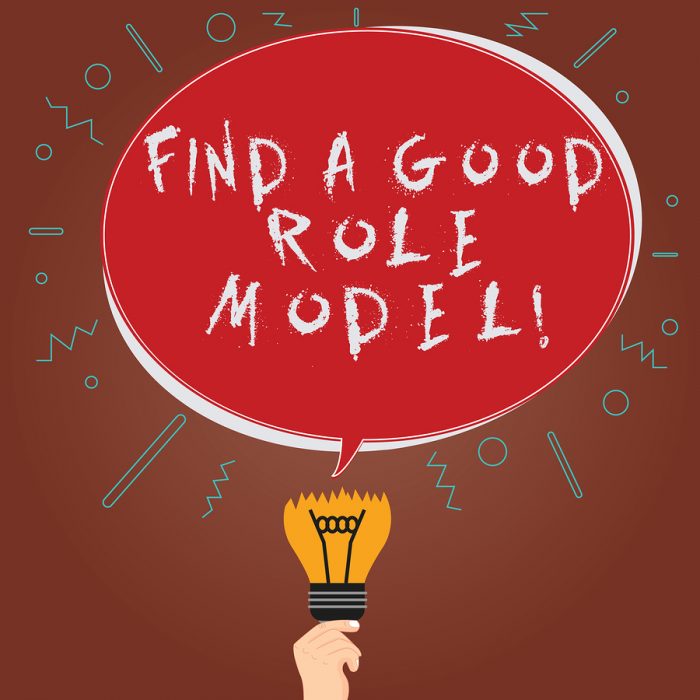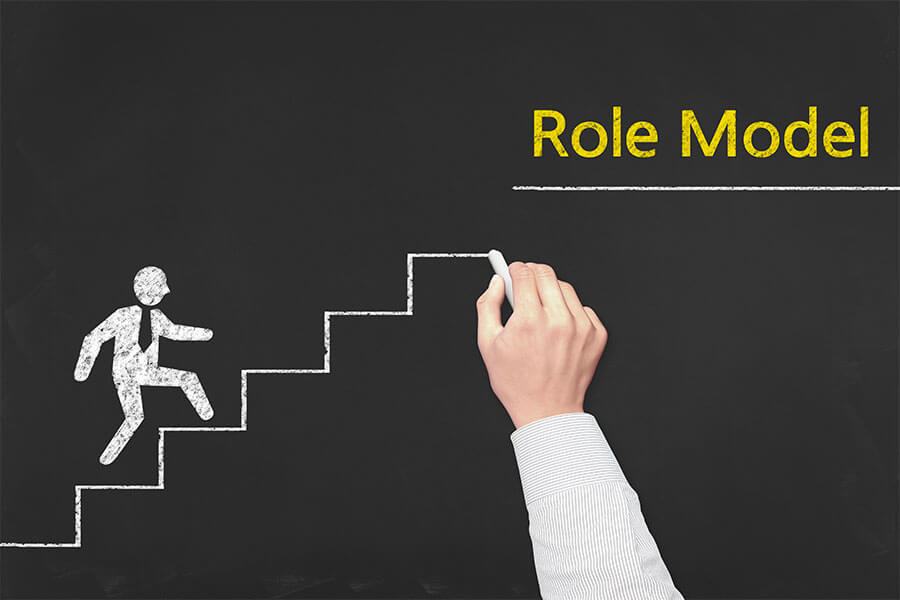People who have developed an addiction may have many people and situations in their life that help perpetuate the cycle. They might have friends and family members that also use and they have habits and places that they go that cause them to continue their substance abuse. When someone chooses to recover it is critical that they find a new and more positive role model to help them focus on sobriety.
Negative role models can be a problematic part of addiction. Addicts can have people in their lives that bring them down because they want a drinking or drug buddy around or simply because they are toxic. In recovery the addict will need to distance themselves from these people and find a role model that is healthy and supportive of their recovery.

The right role models can mean the difference between falling back into hold habits and making important changes that lead to healthier decisions. Role models provide motivation, encouragement and most significantly, a healthy way of life that an addict can imitate or follow. Addiction recovery requires a support system with different kinds of interactions and role models are central to the right kind of support.
Types of Role Models:
- Peer Role Models: Peer role models are individuals who have successfully overcome addiction themselves. They understand the challenges and struggles faced by those in recovery because they have experienced them first-hand. Peer role models can provide empathy, understanding, and a sense of hope to individuals who are currently going through the recovery process.
- Celebrity Role Models: Celebrities who have publicly shared their stories of addiction and recovery can serve as powerful role models. Their fame and visibility make them relatable figures. Their success in overcoming addiction can inspire others to seek help and make positive changes in their lives.
- Community Role Models: Community role models can include local leaders, activists, or volunteers who have made a positive impact in their community while overcoming addiction. These individuals demonstrate that recovery is possible and achievable while contributing to society in meaningful ways.
- Family and Friends: Family members and close friends who have supported someone through addiction and recovery can also serve as role models. Their unwavering support, understanding, and love can inspire individuals to stay committed to their recovery journey and make positive choices.
- Professional Role Models: Therapists, Counsellors or sponsors who work as professionals in the addiction recovery field can serve as role models. They possess expertise that makes them able to provide guidance and motivation to individuals in recovery. These professionals understand the complexities of addiction and offer valuable insights and strategies for maintaining sobriety.
What Makes a Good Role Model
People in recovery often have lost control of their behavior and their lives have become unmanageable. Having a role model gives them someone to look up to and someone they can model their life after. They can give the person motivation and hope for a better future by looking to them for encouragement.
Ideally a role model will be someone who has been through issues of addiction themselves and has overcome them by being sober for many years. It could also be someone who has a deep understanding of addiction such as a counselor or therapist who can guide the addict into changes. Examples of role models can be:
- A sponsor who has successfully completed an addiction program and is active in the recovery community
- Someone in AA meetings or in the recovery community who offers guidance and advice
- A counselor with many years of experience in addiction therapy
- A close friend or family member who is supportive of a sober lifestyle
- A public figure who has openly discussed their addiction struggles and recovery
Whoever the role model may be it is important that they are sober or choose to never drink or use drugs around you. They need to be supportive of your new lifestyle and will always motivate and encourage you to make healthy choices. A good role model can give you an idea of how to structure a healthy lifestyle that does not center around drugs or alcohol.
Choosing a Role Model and Developing a Relationship

When you look for a role model, it should also be someone that you feel you have a personal connection with. You shouldn’t choose someone simply because they are popular but instead focus on your ability to have a positive relationship with them. The connection that you feel with them can help motivate you and bring you closer to your goals through their influence.
It is also important to choose someone who is available for help and is willing to provide you with support and encouragement. Someone who is too busy or who has too many other priorities will not be the best choice for a role model. It also needs to be someone who will be there for you and give you sound advice that applies to your own life.
A good role model will be a positive influence in your life and they will encourage you to be more active in the recovery community. They may help boost your self-esteem, give you something to work toward and inspire you to keep going when you are struggling. As your relationship develops you will bond over shared experiences and they will feel a sense of pride in helping you become a happier and more stable person.
Avoiding Poor Role Models
In addition to finding a positive role model, it is also important to avoid being around people that bring you down and may trigger you to use again. Old drinking buddies, negative friends or people who have failed to find happiness in recovery may be toxic to your progress. There are plenty of people who are sober but still are full of negative thinking and resentment.
It is important to have realistic expectations of what a role model can do for you and use the positive things they can teach you in a practical way. You shouldn’t expect a role model to do all the work for you. A good role model inspires you to put in your own hard work to change your life and develop a healthier lifestyle.
How Role Models Benefit the Recovery Process:

- Instill Hope: Recovery can be challenging, and there will be moments when achieving your goals seem impossible. It’s natural to feel uneasy and tempted to revert to your old addiction life. However, having a role model who has successfully gone through the recovery process and is now living a sober life can instil hope in you. Witnessing their achievements and realizing that they have overcome similar struggles can inspire you to believe in your own ability to meet your goals. This will enable you to embrace a life of sobriety.
- Create Support: Role models provide invaluable support and encouragement. They possess first-hand knowledge and understanding of addiction recovery challenges. They empathize with the pressures, concerns, and societal stigma that accompany your journey. Role models offer support grounded in their own experiences, reinforcing their understanding and providing you with the guidance and encouragement you need.
- Positive Influences: Role models within the mental health and addiction community comprehend the allure and challenges of embracing a sober lifestyle. They are already living the life you aspire to achieve. Surrounding yourself with positive influences is instrumental as you embark on your journey towards the fulfilling life you’ve always desired.
- Provide acceptance: Role models can provide connection and acceptance. Feeling accepted and valued is a fundamental human need, particularly for individuals struggling with addiction and mental health challenges. Isolation and loneliness are common in such circumstances. By connecting with role models who understand your journey and have walked a similar path, you can foster a sense of community. You can also find acceptance, and gain the support needed to navigate your own recovery.
- Healthy Relationships and Social Support: Role models can help individuals build healthy relationships and establish a supportive social network. By observing positive role models, individuals in recovery learn how to cultivate connections with people who encourage their sobriety and well-being. Role models can introduce individuals to recovery communities, support groups, or other resources that provide a sense of belonging and understanding.
- Inspiration: Role models provide inspiration and hope for addiction sufferers. Seeing someone who has successfully overcome similar challenges can prove recovery is possible. Role models demonstrate that a fulfilling life free from substance abuse is attainable. This gives individuals the motivation and belief that they too can recover.
- Guidance: Role models provide guidance for individuals in recovery. They can share their personal experiences, insights and strategies for staying sober. They offer valuable advice and tips for their own recovery journey that would help recovery patients navigate challenges, develop coping mechanisms, and make positive choices.
References




